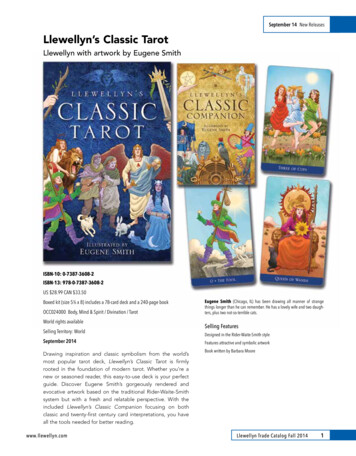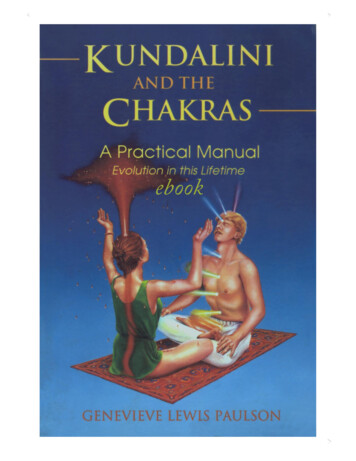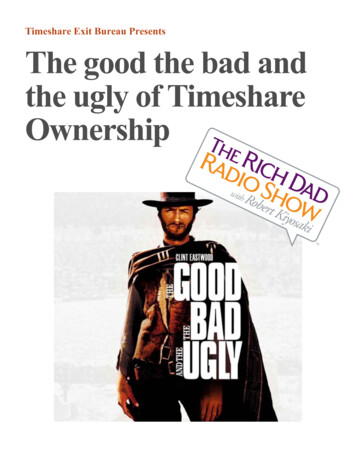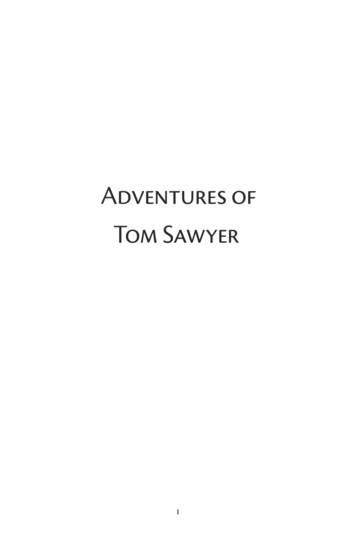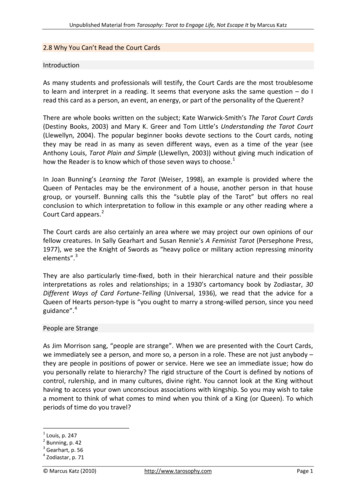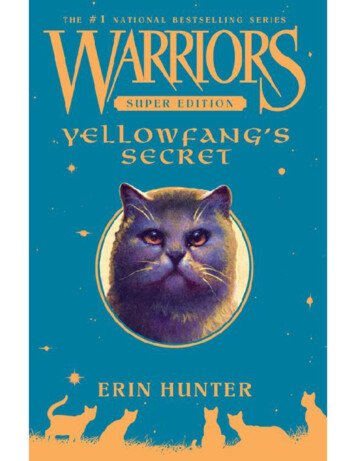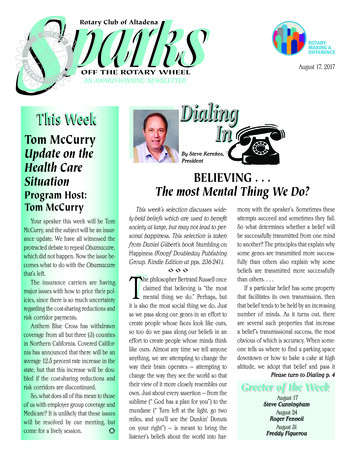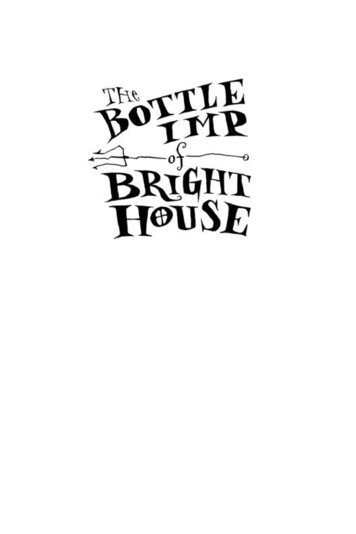
Transcription
byTom Llewellynillustrated byGris GrimlyH oliday H ouseN ew Y ork
Text copyright 2018 by Tom LlewellynIllustrations copyright 2018 by Gris GrimlyAll Rights ReservedHOLIDAY HOUSE is registered in the U.S. Patent and Trademark Office.Printed and bound in July 2018 at Maple Press, York, PA, USA.www.holidayhouse.comFirst Edition1 3 5 7 9 10 8 6 4 2Library of Congress Cataloging-in-Publication DataNames: Llewellyn, Tom (Thomas Richard), 1964-, author.Title: The bottle imp of Bright House / Tom Llewellyn.Description: First edition. New York : Holiday House,2018 Summary: Thirteen-year-old Gabe buys a bottle bearing an impthat will grant his every wish, but someone else will pay the price and,if he dies while owning the bottle, he will lose his soul.Identifiers: LCCN 2017024824 ISBN 9780823439690 (hardcover)Subjects: CYAC: Wishes—Fiction. Demonology—Fiction. Apartmenthouses—Fiction. Family life—Washington (State)—Tacoma—Fiction. Tacoma (Wash.)—Fiction.Classification: LCC PZ7.L7724 Bot 2018 DDC [Fic]—dc23LC record available at https://lccn.loc.gov/2017024824
To my family: Deb, Ben, Abel, Bizayehu,and Genet. To all the wishes granted and allthe ones left hanging, to all the mysteries wesolved and all the ones beyond our fingertips,to all the friends we welcomed at our kitchentable and all the strangers we turned intofriends, to all the jokes, all the tears,all the fires we survived, and to home.Most of all, to home.
Table of contents1.2.You r Las t C h a n c e to Es cap ea nd t h e S O O N -TO - B E - D E A D M 1.22.23.24.25.1I I NT R O D U C E YO U TO T H E T E N A N TS, T H E F RI E N D,A WA R NI N G F R O M D O CTO R M AN D R AK ET U G -OF-WArI COM E I N TO P O SS E SS I O N O F T H E B OT T LEI MA K E M Y SECO N D W I S HA KEY IS DELIVEREDA D E AT H I S AN N O U N C EDI VI E W A D E AD B O DYA BE T W I T H J OAN N AI N S I D E H AS H IM OTO ’ S ST U D I OJOA NN A M AK E S A B O L D R EQ UE STWE RIDE THROUGH THE NIGHTBR O K E N B O N E S AN D LO O S E L IP ST H E BOT T L E D R AW S B LO O DI MA K E A D E AL W I T H L AN CAS T ERA S E R I E S O F S Q U E A KST H E SE A G OAT AN D T H E B U L LR I G H T I NG W R O N G SW E H UNT FO R T H E B OT T L EJOA NN A M AK E S H E R O N LY W ISHT H E P ORT R AI TI MA K E A D EC I S I O NONE P E N N YA N D L AS Te p i log u 76188195206209
1GYour Last Chance to EscapeThisst o ry is98perce nt true .What I mean by that, Dear Reader, is that it’s just astrue as I can stand to make it.Mrs. Appleyard said everyone lies. She knew betterthan most. Our late landlady lied all the time. And cheated.And ripped off everybody who lived in her building, theBright House Apartments.And by late, I don’t mean she wasn’t on time. Late, inthis case, means dead. As in the late Mrs. Appleyard. Because I’m sure she’s dead. Well, pretty sure.When she was still alive, and when something wouldbreak in our apartment, Mom or Dad would send me acrossthe street to tell Mrs. Appleyard. Across the street was atavern called Hank’s Bar. Mrs. Appleyard spent half hertime in one of Hank’s booths, staining the ceiling above herwith against-the-rules cigarette smoke. I hated going overthere, because I could never escape without a five-minuteconversation. It would usually go something like this:1
“Mrs. Appleyard, my mom wants me to tell you there’sno water coming out of the shower.”“She does, does she? Then why doesn’t she come overherself? Doesn’t it seem strange to you that your mother—if she is your mother—sends a child to a tavern?”“Yeah, well, the shower stopped working and she’s gota head full of shampoo and no clothes on.”“What’s her name, again? This woman you call yourmother?” Mrs. Appleyard took a swallow from her glass ofred, fizzy liquid.“Umm—Kathleen.”“Kathleen. So she’s Irish. And she doesn’t want tocome to the bar? But your last name is Silver. Isn’t thatJewish?”“I think English and some other stuff. I don’t reallyknow.”“You don’t know? But you do know this Irish woman isyour mother?”“Yes, and I’m supposed to tell you—““The shower. I know. How do you know she’s your realmother?”“I’m pretty sure.”“Mr. Appleyard thought he knew his real parents, too.He eventually found out he was no relation. They boughthim off a boat, if you can believe it, down at the docks. Hisparents took him home in a Styrofoam cooler, same wayyou’d take home a catch of Dungeness crab. Then they liedto him about it.” She took another swallow of her red fizzyliquid. “It’s been my experience, and continues to be my experience, that all people are liars. I know I’m one. In fact,2
I’m going to lie right now.” She smiled. “Tell your supposedmother I’ll be right over.”That’s a tiny sample—a little sip—of Mrs. Appleyard. Iwished I could have found a way to avoid hearing her stories. But I didn’t have a choice. My parents made me theirmessage boy.But you, Dear Reader, you have a choice. You can setthis book down right now and go read a car magazine instead. You can go outside and run a race down the blockagainst your best friend. You probably won’t believe me,anyway. But this story is true. At least one little devil appears. At least one bone breaks. At least one person dies—maybe more. And the hot tub that comes out of nowhere—well, I’m just saying that it all happened. This is as closeto the facts as I can stand to get.Maybe you shouldn’t believe. Maybe you’ll sleep betterif you don’t. And maybe you should remember what Mrs.Appleyard said, about all people being liars.3
2Gi introduce you to the tenants,the friend,and the soon-to-be-dead manMyna m e i sG abe . But that’s enough about me. Andyou’ve already met Mrs. Appleyard.Next is a girl named Joanna. She causes all sorts ofproblems. She’s in seventh grade, like me. I have permanent bruises on both arms because of her.Henry’s my best friend. Some people think we’re related, like brothers or cousins, because they hardly ever seeone of us without the other. I guess I could hang out withother people, but—I don’t know—the truth is I’d ratherjust hang out with Henry, even if he drives me crazy sometimes. By the way, he used to be the catcher on our baseballteam, before he broke his arm, but that comes later.Mr. Shoreby is a really rich guy. Don’t get too attachedto him. He’ll be dead soon.Then there’s Doctor Mandrake, who lives on the topfloor of my building. He’s the one who’s gonna tell me notto lose my soul.Turns out it’s harder than it sounds.4
Most of this story happened at the Bright House Apartments. The Bright House sat across the street from Hank’sBar, in Tacoma, Washington. Next to the bar was the Corner Store, where Mr. Kim sold beef jerky, expired candy,and car magazines wrapped in plastic. Don’t worry aboutMr. Kim. He doesn’t come into play. In fact, let’s not mention him at all after this. Let’s get to what actually happens. The details.Just remember, Dear Reader, the Devil is in the details.Dad claimed the Bright House was white. That’s whathe said when he first gave Mom directions, before wemoved in. “It’s the big white building, right across from thestore,” said Dad. His voice was coming out of the speakeron Mom’s phone.“Across from the bar, you mean?” asked Mom. My little sisters and I were staring out the window of Mom’spool-cleaning van. “There is no white building. There’s abrick building, but the sign on that says Gregor Manor. Andnext to that is an old gray thing.”“That’s the one.”“Oh, Johann. You’ve got to be kidding me. You want usto live there?”“I already signed the lease.”“You signed it? For how long?”“One year.”“Johann, you can’t be serious. The building looks likeit’s about to fall apart.”The Bright House Apartments building was shaped likea cube. I say was, Dear Reader, because it’s not there anymore. When it was still standing, it was three stories tall5
and had eight units. Actually, more like seven and one-quarter.On the first floor was Mrs. Hashimoto, a painter—she paintedart, not houses. The floor outside her door was speckled withbits of red, blue, and black paint. I would not meet her foranother two weeks.Right next to her lived a man named Jimmy Hyde, whoI soon learned seemed to do nothing except sit behind hislocked door and play Hawaiian music. Which was fine byme. On the rare occasions when he did come out, he lookedabout a hundred years old, with a few wisps of white hairon his head, a face full of wrinkles, and a few brown teethin his mouth.Mrs. Appleyard lived in one big unit that took up one6
whole side of the first floor. I don’t know why she neededall that space, since she spent nearly all her time in Hank’sBar.The quarter unit belonged to Alejandro Aguilar, the fixit man. His tiny apartment was jammed under the stairs onthe first floor.“Alley Handro can help you with your heavy stuff,” saidMrs. Appleyard on the first of May, the day we moved in.Alley Handro. That’s how she said his name, all hard letters. Mrs. Appleyard had a glass of that red fizzy stuff inher hand. She drank it through a straw.“He can help?” said Dad. “That would be great. See whata nice place this is, honey? They even help you move in.”7
Mom hefted a box without a word.Our unit was on the second floor, along with two otherfamilies. In the small apartment next door lived “the weirdgirl with the sick mom,” in the words of my sisters. Rightacross the hall from us was a family named Brackley. Theywere gone the day we moved in. “On some fancy vacation,”said Mrs. Appleyard. “Fanciest folks in the building.”“See, honey?” said Dad, as he and Alejandro tried toangle our old, worn couch through our front door. “We’reright across the hall from the best folks in the building.”Mrs. Appleyard sucked on her straw. “I didn’t say thebest. I said the fanciest.”“How many people live upstairs?” said Mom, glaring atthe glass in the landlady’s hand.“Just the one,” said Mrs. Appleyard. “Doc Mandrake.”“A doctor?” said Dad. “Honey, we’ve got a doctor livingupstairs from us.”“He ain’t a real doctor,” said Mrs. Appleyard. “Can’thelp you with as much as an infected toenail. He’s somesort of astro—what do you call it—he studies stars andplanets and all that.”“An astronomer? A man of science?”“Something like that.”“I’d rather have a real doctor,” said Mom.“You and me both,” said Mrs. Appleyard, taking anothersuck on the straw. “Bunch of hocus-pocus if you ask me.Mr. Appleyard never did cotton to any of that py nonsense.” Shekept talking while Mom dropped her box in the hallway andwent downstairs for another.8
Alejandro and Dad muscled our old couch throughour door and dropped it with a thud. Alejandro Aguilarwas a white-haired man with light brown skin. When hefinally finished jamming the last piece of furniture insideour apartment, he handed Dad a piece of yellow paper.“What’s this?” said Dad.“This is a bill from Mrs. Appleyard.”“A bill? Two hundred dollars? But I already paid therent.”“Not for rent,” said Alejandro. “This bill is for movingfees.”Dad took the bill down to Mrs. Appleyard’s apartment tocomplain, but she wasn’t there. Alejandro pointed to the baracross the street. Dad marched the bill to Hank’s. When hecame back ten minutes later, I asked him what happened.“Don’t mention this to your mother,” he said.Our apartment was listed as a three-bedroom. Thatwas a stretch. My parents had the biggest room, whichwas smaller than my bedroom in our old house. My sisters’bunk beds nearly filled their shared room. Their dressertouched the bed on one side and the wall on the other. Dadcalled it cozy. The only window in their room was cut inhalf by a wall.My room was even skinnier, but longer. It was slightlyless wide than a mattress, so we ditched my bedframe andjust laid the mattress on the floor. Both sides curled upagainst the walls. The other half of the window from mysisters’ room was at the end, just above my pillow.“Johann, this isn’t a bedroom. It’s barely even a hallway. Gabriel can’t sleep here. His bed is like a trough.”9
“Cozy,” said Dad. “Just think of it as cozy.”The living room and kitchen weren’t too bad. No diningroom. No entryway. But the weirdest features in the apartment were the white, circular fixtures on every wall. Therewere eight of them in the living room, eight in the kitchen,and four in each bedroom. Each one had a tiny red lightthat blinked every second.“What are those things?” said Mom. “They look likesmoke detectors.”“They are smoke detectors,” said Dad. “Same kind asthe one we had in our old house. I guess they really careabout safety. That’s good. Isn’t that good, honey?”“It’s weird. It creeps me out.”Dear Reader, I would hear those smoke detectors go offone day. I would hear them all sing together, like some sortof screeching, electronic choir.More smoke detectors lined the hallway, the stairs,and everywhere else throughout the building. When I saidthey creeped me out, too, Dad said, “Keep your thoughtsto yourself, Gabe, because this place is all we can afford.Heck, we can’t really even afford this, unless I get a betterjob somehow, somewhere.”“I don’t see how you can’t find a job,” I said. “You’ve gotso many degrees. I mean, you’re a doctor, too.”“Doctors of sociology don’t get jobs as easily as doctorsof medicine,” Dad said.The university had fired Dad. Whenever I said that—that he was fired—Dad got all cranky. “I wasn’t fired. Theyhad to do some right-sizing. Someone had to go. It just happened to be me.”10
“Sounds like you just happened to get fired,” I said.Right now, Dad was teaching part-time at the community college during the day and delivering pizzas for Hasty’sPizza at night. His car smelled like pizza all the time.Mom was a writer who didn’t seem to make any money from the travel books she wrote. I wouldn’t recommendbuying one. I mean, she’s never really done any traveling, except driving from pool to pool around Tacoma. Shecleaned swimming pools and hot tubs while we were atschool. Her van smelled like chlorine.Both my parents’ cars smelled like lousy jobs.But Mom still wrote books about climbing Kilimanjaro, walking the Great Wall of China, and bicycling throughHolland. As far as I knew, she’d never been to any of thoseplaces. If she’d gone, she sure hadn’t taken me with her.When Dad finished assembling our beds, he said he needed to go to work at Hasty’s. “You’re leaving now?” askedMom. “We haven’t even gotten the furniture situated.”“Gabriel can help you,” said Dad. “He’s practically aman now.”“Thirteen is not a man,” said Mom.Dad squeezed my arm, as if checking a peach to see ifit was ripe. He shrugged, then left. For the next two hours,Mom ordered my sisters and me around until we got theliving room in some kind of shape.My sisters, Meg and Georgina, were nine-year-oldtwins. Georgina cut her own hair with scissors, “becausethe salon people never make it short enough.” Georginatook after Mom. She wore hiking boots and helped Momchange the oil on both our cars. Meg was more interested11
in changing her nail polish, which she did precisely everythree days.When Mom finally let us go, I went into my bedroom tostart decorating it.Last night I’d slept in my room in our old house. Itwasn’t like the old house was anything special, but we’dhad a backyard with a trampoline. Just the closet in my oldroom was almost as big as this whole room.All day, Dad had kept telling me I should be gratefulI had a roof over my head. I’d said, “It’s not a roof. It’s afloor. I have Doctor Mandrake’s floor over my head.”I shoved my mattress up against the half window andput my dresser on the other end of the narrow room. Therewas no space next to my bed for my nightstand, so I putthat at the foot end of my mattress.I hung my car posters on the walls, starting at the farend with the orange McLaren F-1. Then came the 1961 blueJaguar E-Type—the one that some people call the XK-E. After that was the yellow Lamborghini Miura. I’m not muchof a Lamborghini fan, but Henry got me that poster for mylast birthday, so I kind of had to hang it up. Then came the1955 silver Mercedes-Benz 300SL, the 2004 Porsche Carrera GT, and the black AC Cobra with the two white stripesright up the middle.The Cobra had been my favorite for years, because itwas just so mean looking. That was until I saw the Ferrari430. Four-thirty as in 430 horsepower. Top speed of 196miles an hour.Dear Reader, by now you probably get that I like cars.They go fast. They can take you anywhere. They look12
cool—at least the nice ones. Freedom, power, and coolness,just rolling down the road. So I like them. Maybe even lovethem. But I’ve never been in a position to do anything morethan dream, because my mom and dad—like most grownups—seem to secretly hate cars. Or they hate the fact thatthey can’t afford the good ones. Or maybe Mom and Dadhate cars because they’re reminders that they don’t haveany freedom, don’t have any power, and aren’t cool.The Ferrari 430 was the car in the poster closest to thehead of my bed. Painted in Ferrari red, of course. Its bodywas so smooth and flowing it looked as much like a seacreature as it did a car. I would have given my right armjust to see one. I would have given both arms to own one.Turned out, I’d get to keep my arms. I’d only have togive my soul.13
HOLIDAY HOUSE is registered in the U.S. Patent and Trademark Office. Printed and bound in July 2018 at Maple Press, York, PA, USA. www.holidayhouse.com First Edition 1 3 5 7 9 10 8 6 4 2 Library of Congress Cataloging-in-Publication Data Names: Llewellyn, Tom (Thomas Richard), 1964-, author. Title: The bottle imp of Bright House / Tom Llewellyn.

